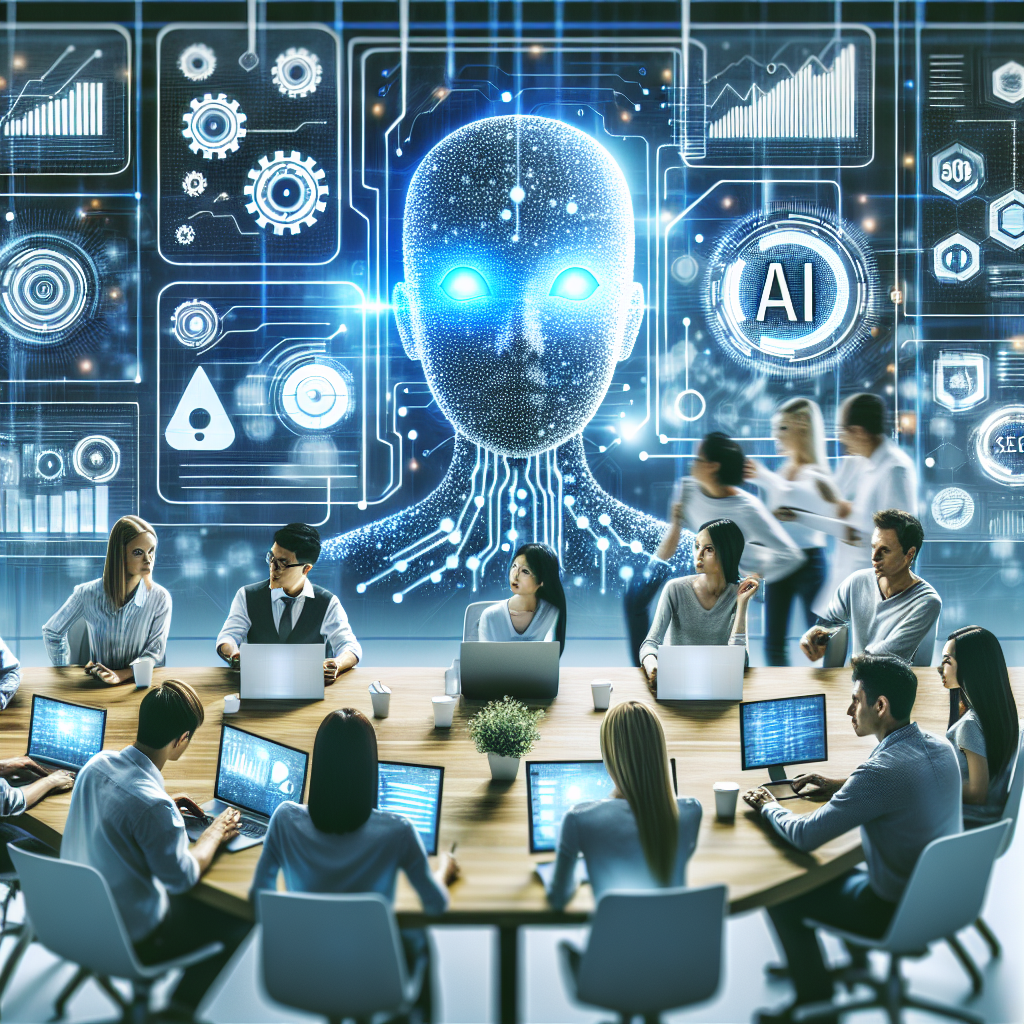The Rise of AI-Powered Content Teams: Revolutionizing Digital Marketing
Introduction
In the ever-evolving landscape of digital marketing, businesses are constantly seeking innovative ways to stay ahead of the curve. One of the most intriguing developments in recent years has been the emergence of AI-powered content teams. These sophisticated systems, leveraging cutting-edge technologies like n8n, OpenAI, and Aidbase, are reshaping how companies approach content creation, SEO, and overall digital presence.
As someone who’s been in the trenches of digital marketing for over a decade, I’ve seen my fair share of game-changing innovations. But I’ve got to say, the potential of AI content teams is something else entirely. We’re not just talking about a new tool or platform here – we’re looking at a fundamental shift in how content is conceptualized, created, and distributed.
Now, here’s the thing: this isn’t just some pie-in-the-sky concept. We’re seeing real-world applications that are yielding impressive results. But as with any transformative technology, there are questions, concerns, and potential pitfalls that need to be addressed. In this article, we’ll dive deep into the world of AI content teams, exploring their capabilities, implications, and the broader impact on the digital marketing landscape.
The Technology Behind AI Content Teams
Let’s start by breaking down the core technologies that make AI content teams possible. At the heart of these systems are sophisticated machine learning algorithms, natural language processing (NLP) capabilities, and advanced data analytics tools. Platforms like n8n provide the workflow automation backbone, while OpenAI’s language models power the content generation process. Aidbase serves as a *crucial* link, helping to manage and optimize the AI agents’ performance.
What’s particularly fascinating is how these technologies work in concert to mimic human-like content creation processes. We’re not talking about simple text generation here – these systems can conduct research, synthesize information, and even create visual content like thumbnails. The level of sophistication is truly remarkable.
Dr. Sarah Mitchell, a Technology Innovation Specialist at MIT Technology Review, puts it succinctly: “The future of AI-powered content creation lies in understanding the intersection of technology and human behavior.” This observation hits the nail on the head. The most effective AI content teams don’t just churn out text; they’re designed to understand audience preferences, engagement patterns, and the nuances of human communication.
The Impact on Content Strategy and SEO
Now, let’s talk about the elephant in the room: how does this technology impact content strategy and SEO? The potential is enormous. According to recent industry analysis, the AI-powered content market is expected to grow by 15.3% annually through 2025. This rapid growth is driven by the technology’s ability to produce high-quality, SEO-optimized content at scale.
What I find particularly interesting is how AI content teams are changing the game when it comes to content consistency and frequency. Traditionally, maintaining a regular publishing schedule has been a challenge for many businesses. But with AI agents taking over tasks like research, writing, and even publishing, companies can maintain a steady stream of fresh content with minimal human intervention.
Michael Thompson, a Senior Industry Analyst at Global Business Insights, notes, “What we’re seeing with AI-powered blogging is not just a trend, but a fundamental shift in how industries operate.” He’s spot on. This isn’t just about automating content creation – it’s about reimagining the entire content strategy process.
But here’s where things get tricky. While the efficiency gains are undeniable, there are legitimate concerns about the impact on search engine rankings. Google has been clear about its stance on AI-generated content, emphasizing the importance of E-E-A-T (Experience, Expertise, Authoritativeness, and Trustworthiness). The question is: can AI content teams truly meet these criteria?
The Human Element: Challenges and Considerations
As impressive as AI content teams are, it’s *crucial* to recognize that they’re not a silver bullet. There are *significant* challenges and considerations that businesses need to grapple with. One of the most pressing issues is the potential loss of brand voice and authenticity. While AI can mimic writing styles, there’s a certain je ne sais quoi that comes from human-created content – a personal touch that can be difficult to replicate.
Moreover, there’s the question of originality and creativity. AI systems, no matter how advanced, are ultimately drawing from existing data and patterns. They can combine and recombine information in novel ways, but true creative leaps – the kind that can set a brand apart – are still the domain of human minds.
Another critical consideration is the ethical implications of AI-generated content. As these systems become more sophisticated, we’ll need to grapple with questions of transparency, attribution, and the potential for misinformation. It’s a complex issue that doesn’t have easy answers.
In my experience, the most successful implementations of AI content teams are those that find a balance between automation and human oversight. It’s not about replacing human creativity, but augmenting it – allowing content creators to focus on high-level strategy and truly unique pieces while letting AI handle the more routine aspects of content production.
Measuring Success: Metrics and ROI
Of course, at the end of the day, businesses need to see tangible results. So how do we measure the success of AI content teams? The metrics can be surprisingly positive. Studies show that 73% of businesses implementing AI-driven blog strategies see improved performance within 6 months. This improvement can manifest in various ways – increased traffic, better engagement rates, higher search engine rankings, and ultimately, improved conversion rates.
What’s interesting is that the benefits often extend beyond just content performance. By freeing up human resources from routine content creation tasks, businesses can reallocate talent to more strategic initiatives. This can lead to broader improvements in marketing effectiveness and overall business performance.
Lisa Chen, a Strategic Business Consultant at Innovation Partners LLC, observes, “The integration of AI-powered content creation has become *essential* for companies looking to remain competitive in today’s market.” I couldn’t agree more. In an increasingly crowded digital landscape, the efficiency and scalability offered by AI content teams can be a *significant* competitive advantage.
However, it’s *important* to approach these metrics with a critical eye. While the short-term gains can be impressive, the long-term impact is still somewhat uncertain. Will search engines eventually develop more sophisticated methods for detecting and potentially penalizing AI-generated content? How will audience preferences evolve as they become more aware of AI-created material? These are questions that don’t yet have definitive answers.
The Future of AI Content Teams
As we look to the future, it’s clear that AI-powered content creation is here to stay. Market data indicates that adoption of these technologies has increased by 45% since 2023, and this trend shows no signs of slowing down. But what does the future hold?
I believe we’re going to see increasingly sophisticated AI systems that can handle more complex content creation tasks. We might see AI that can craft long-form articles with nuanced arguments, or systems that can create multimedia content seamlessly integrating text, images, and video.
Moreover, I expect we’ll see greater integration between AI content teams and other marketing technologies. Imagine AI systems that not only create content but also dynamically personalize it for individual users, optimize it in real-time based on performance data, and seamlessly distribute it across multiple channels.
But here’s the caveat: as these systems become more advanced, the importance of human oversight and strategic direction will only increase. The businesses that thrive will be those that find the right balance between AI efficiency and human creativity and judgment.
Conclusion
The rise of AI-powered content teams represents a seismic shift in the world of digital marketing. The potential benefits – increased efficiency, scalability, and consistency – are immense. But so too are the challenges and ethical considerations.
As we navigate this new landscape, it’s *crucial* that we approach AI content teams not as a replacement for human creativity, but as a powerful tool to augment and enhance our capabilities. The future of content creation lies not in choosing between human and AI, but in finding the optimal synergy between the two.
Ultimately, the success of AI content teams will depend on how we implement and manage them. It’s not just about the technology – it’s about the strategy behind it, the oversight we provide, and the values we imbue in these systems.
As we move forward, one thing is certain: the world of content creation will never be the same. And personally? I can’t wait to see where this journey takes us next.




Leave a Reply